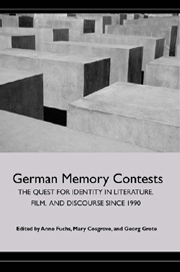Introduction: Germany's Memory Contests and the Management of the Past
Published online by Cambridge University Press: 05 February 2013
Summary
In an essay entitled “The Present as History,” the eminent British historian Eric Hobsbawm cites the famous opening lines of L. P. Hartley's novel The Go-Between (1953): “The past is another country. They do things differently there.” For Hobsbawm, Hartley's aphorism aptly summarizes a key idea that should guide good historical research, namely that historical understanding is premised on the “otherness of the past.” When historians fail to keep this insight in mind, they run the risk of producing anachronisms rather than credible historical explanations. And yet, the point of Hobsbawm's essay is to turn this premise precisely on its head by examining how historians' own experiences of history can influence their perceptions of it in a fundamental way. Citing John Charmley's Churchill biography as an example, Hobsbawm argues that the biographer's attempt to reassess Chamberlain's long-discredited appeasement policy was only possible because Charmley was not a member of the war generation who had experienced this period first hand. For Hobsbawm, his generation of historians did not have to go to the archives to know that a deal with Hitler was simply impossible. Of course, Hobsbawm's point is not that only old men write good history but rather that historical research is malleable: the passing of the political generation that had direct experience of the Second World War is a case in point in that it marks “a major, if often silent, shift in that country's politics, as well as in its historical perspective on the war and — as is evident in both France and Italy — Resistance.”
- Type
- Chapter
- Information
- German Memory ContestsThe Quest for Identity in Literature, Film, and Discourse since 1990, pp. 1 - 22Publisher: Boydell & BrewerPrint publication year: 2006

